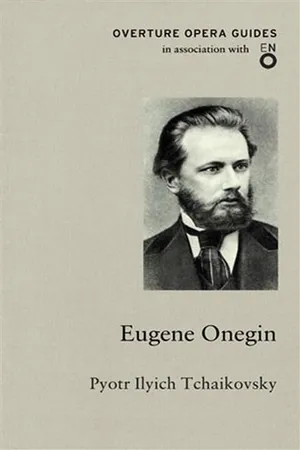About this book
Eugene Onegin is the most popular of Tchaikovsky's operas. Entitled 'Lyrical Scenes after Pushkin' by the composer, the work takes as its basis the poem of the same name by the great Russian writer Alexander Pushkin. Its story of the unrequited love of Tatyana for the world-weary Onegin has exerted an irresistible hold over audiences for over a hundred years. With its combination of intimate private moments and sumptuous public scenes, the opera is one of the most fully achieved ever written.In this guide there is an article comparing Pushkin's original with its treatment in the opera, a detailed musical analysis and an appreciation of Tchaikovsky's particular skill as a word-setter. An essay on its performance history details the contributions of the most notable artists who have taken part in productions of the work. Illustrations, a thematic guide, the full libretto with English translation and reference sections are also included.Contains: Pushkin into Tchaikovsky, Caryl EmersonTchaikovsky's Eugene Onegin, Roland John WileyAn Appreciation of Eugene Onegin, Natalia ChallisA Domestic Love, Marina Frolova-WalkerEugene Onegin: A Selective Performance History, John AllisonEugene Onegin: Libretto by Pyotr Ilyich Tchaikovsky, Konstantin Shilovsky and Modest Tchaikovsky after the novel in verse by Alexander PushkinEugene Onegin: English Translation by Opernfuehrer
Tools to learn more effectively

Saving Books

Keyword Search

Annotating Text

Listen to it instead
Information
Table of contents
- Pushkin into Tchaikovsky
- Tchaikovsky’s Eugene Onegin
- An Appreciation of Eugene Onegin
- A Domestic Love
- Eugene Onegin: A Selective Performance History
- Thematic Guide
- Eugene Onegin
- Note on the Text
- Act One
- Act Two
- Act Three
- Select Discography
- Eugene Onegin on DVD, a Selection
- Select Bibliography
- Tchaikovsky Websites
- Note on the Contributors
- Acknowledgements
Frequently asked questions
- Essential is ideal for learners and professionals who enjoy exploring a wide range of subjects. Access the Essential Library with 800,000+ trusted titles and best-sellers across business, personal growth, and the humanities. Includes unlimited reading time and Standard Read Aloud voice.
- Complete: Perfect for advanced learners and researchers needing full, unrestricted access. Unlock 1.4M+ books across hundreds of subjects, including academic and specialized titles. The Complete Plan also includes advanced features like Premium Read Aloud and Research Assistant.
Please note we cannot support devices running on iOS 13 and Android 7 or earlier. Learn more about using the app
